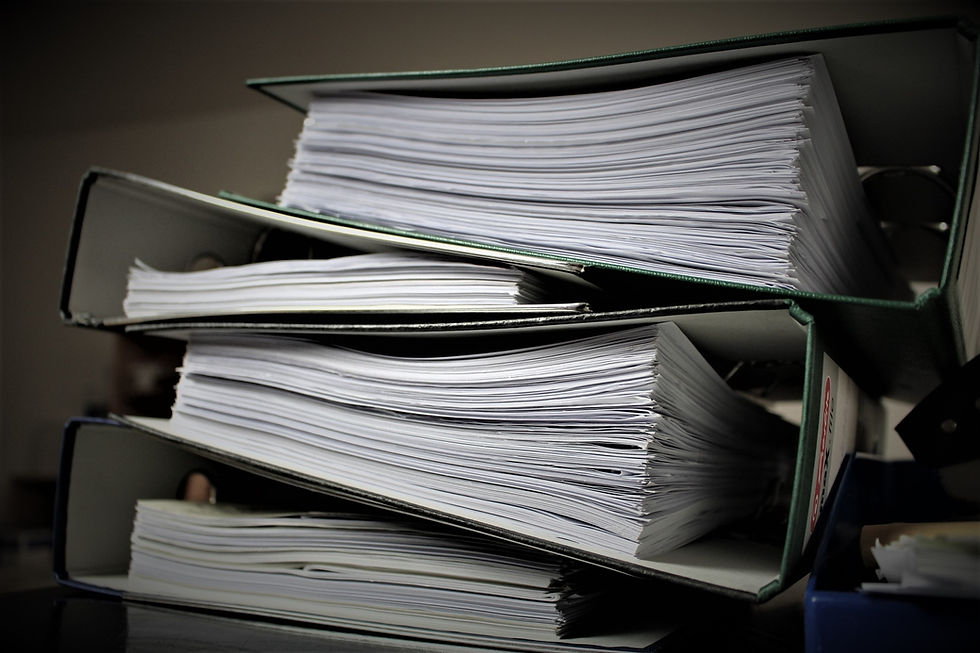Cape Intermediate Holdings Limited v Graham Dring [2018] EWCA Civ 1795
- Oscar Davies
- Sep 13, 2018
- 3 min read

This case has now been updated. View our article on the most recent judgement here.
Court of Appeal clarifies the extent of non-party’s right to obtain access to documents in court proceedings in Cape Intermediate Holdings Limited v Graham Dring [2018] EWCA Civ 1795.
Background
An application was made by the Asbestos Victims Support Groups Forum UK ("AVSGF”), under CPR r.5.4(C), to access a wide range of documents involving insurance for various asbestos related payments used or disclosed in product liability proceedings involving Cape Intermediate Holdings Ltd, which settled prior to judgment.
CPR r.5.4(C) provides that non-parties may obtain statements of case (the claim form, particulars of claim, defence and reply - but not documents attached to them) but the court's permission is required to obtain "from the records of the court a copy of any other document filed by a party at court".
High Court Master Victoria McCloud held that all documents filed with the court, including “trial bundles and documents, such as skeleton arguments and transcripts”, were within the court’s jurisdiction and formed part of the order for disclosure. AVSGF were therefore provided access to the majority of the documents sought. Cape Intermediate Holdings Ltd appealed on four grounds:
The Master failed to identify which documents the court had the power to permit a non-party to copy and had no jurisdiction under CPR r.5.4(C) to make the order;
The Master applied the wrong discretionary test as to jurisdiction;
The Master should have found that the AVSGF failed to meet the requisite test; whether it be "strong grounds in the interests of justice" or merely a "legitimate interest';
The order was incorrect in principle and failed to address the volume of material to which it applied.
Appeal
Inherent jurisdiction to disclose to non-parties
Lord Justice Hamblen, who gave the judgment in the Court of Appeal, with which Sir Brian Leveson, President of the Queen's Bench Division and Lord Justice Newey agreed, concluded that the Master had exceeded the narrow confines of CPR r.5.4(C), in particular that “records of the court” do not generally include: trial bundles, trial witness statements, trial expert reports, trial skeleton arguments, submissions or trial transcripts. These are distinct from statements of case, which may be obtained without permission under CPR r.5.4(c)(1)(a) and under CPR r.2.3(1).
The court explained that there is no inherent jurisdiction to allow non-parties inspection of (a) trial bundles, and (b) documents which have been referred to in skeleton arguments/written submissions, witness statements, expert reports or in open court simply on the basis that they have been so referred to. However, there is inherent jurisdiction to allow non-parties inspection of: witness statements of witnesses (including experts) whose evidence stands as evidence in chief and would have been available during the course of trial; documents in relation to which confidentiality has been lost under CPR r.31.22 and which are read out in open court; and skeleton arguments/written submissions read by the court.
Open justice
Lord Justice Hambledon also held that the open justice principle should not be held narrowly and that in this instance it was engaged. The case of GIO Personal Investment Services Ltd v Liverpool & London Steamship P&I Ass. Ltd [1999] 1 WLR 984 was, according to Lord Justice Hamblen, authority that the court had an inherent jurisdiction to allow non-parties to obtain copies of skeleton arguments and written submissions used in lieu of oral submissions. "The reason for this is that open justice requires that the public have the same opportunity to understand the issues in a case as they would have had if the openings had been given orally," he said. The court held that this same principle applies even if a case settles before judgment.
Comment
The decision helpfully clarifies the extent of the CPR r.5.4(C) provision to grant non-party access to records of the court, and the way in which the court’s inherent discretion should be exercised where an application by a non-party is made for such disclosure. In exercising its discretion to grant non-party access, whether under CPR r.5.4C(2) or the court’s inherent jurisdiction, the court has to balance the non-party’s reasons for seeking copies of the documents against the parties’ private interest in preserving their confidentiality. By this judgment, the court has now provided some helpful guidance as to the proper procedure to be adopted for non-party applications, so as to ensure that appropriate safeguards are put in place regarding all categories of documents.


![Davidoff & Ors v Hargrave [2023] EWHC 1825 (KB)](https://static.wixstatic.com/media/003c20_30a4ccdc02594d869d0049c8a6809976~mv2.png/v1/fill/w_352,h_250,fp_0.50_0.50,q_35,blur_30,enc_avif,quality_auto/003c20_30a4ccdc02594d869d0049c8a6809976~mv2.webp)
![Davidoff & Ors v Hargrave [2023] EWHC 1825 (KB)](https://static.wixstatic.com/media/003c20_30a4ccdc02594d869d0049c8a6809976~mv2.png/v1/fill/w_38,h_27,fp_0.50_0.50,q_95,enc_avif,quality_auto/003c20_30a4ccdc02594d869d0049c8a6809976~mv2.webp)






![Soriano v Forensic News LLC & ors [2021]](https://static.wixstatic.com/media/003c20_6657842b9764460dbc1dc14afe2b77fe~mv2.jpg/v1/fill/w_380,h_250,fp_0.50_0.50,q_30,blur_30,enc_avif,quality_auto/003c20_6657842b9764460dbc1dc14afe2b77fe~mv2.webp)
![Soriano v Forensic News LLC & ors [2021]](https://static.wixstatic.com/media/003c20_6657842b9764460dbc1dc14afe2b77fe~mv2.jpg/v1/fill/w_38,h_25,fp_0.50_0.50,q_90,enc_avif,quality_auto/003c20_6657842b9764460dbc1dc14afe2b77fe~mv2.webp)
![ZXC v Bloomberg [2022] – The Supreme Court delivers another blow to the British media](https://static.wixstatic.com/media/003c20_61ca34e9d65448b7ad6338ba1b512a70~mv2.png/v1/fill/w_339,h_250,fp_0.50_0.50,q_35,blur_30,enc_avif,quality_auto/003c20_61ca34e9d65448b7ad6338ba1b512a70~mv2.webp)
![ZXC v Bloomberg [2022] – The Supreme Court delivers another blow to the British media](https://static.wixstatic.com/media/003c20_61ca34e9d65448b7ad6338ba1b512a70~mv2.png/v1/fill/w_38,h_28,fp_0.50_0.50,q_95,enc_avif,quality_auto/003c20_61ca34e9d65448b7ad6338ba1b512a70~mv2.webp)
![Blake, Seymour & Thorp v Fox [2021]](https://static.wixstatic.com/media/003c20_288aede1956d456da7fe750492b86688~mv2.png/v1/fill/w_328,h_250,fp_0.50_0.50,q_35,blur_30,enc_avif,quality_auto/003c20_288aede1956d456da7fe750492b86688~mv2.webp)
![Blake, Seymour & Thorp v Fox [2021]](https://static.wixstatic.com/media/003c20_288aede1956d456da7fe750492b86688~mv2.png/v1/fill/w_38,h_29,fp_0.50_0.50,q_95,enc_avif,quality_auto/003c20_288aede1956d456da7fe750492b86688~mv2.webp)


![Abramovich v (1) HarperCollins Publishers Limited (2) Catherine Belton [2021]](https://static.wixstatic.com/media/003c20_5840605aa29f4ff9aa2f6b4b3bf36e28~mv2.png/v1/fill/w_328,h_250,fp_0.50_0.50,q_35,blur_30,enc_avif,quality_auto/003c20_5840605aa29f4ff9aa2f6b4b3bf36e28~mv2.webp)
![Abramovich v (1) HarperCollins Publishers Limited (2) Catherine Belton [2021]](https://static.wixstatic.com/media/003c20_5840605aa29f4ff9aa2f6b4b3bf36e28~mv2.png/v1/fill/w_38,h_29,fp_0.50_0.50,q_95,enc_avif,quality_auto/003c20_5840605aa29f4ff9aa2f6b4b3bf36e28~mv2.webp)
Comments